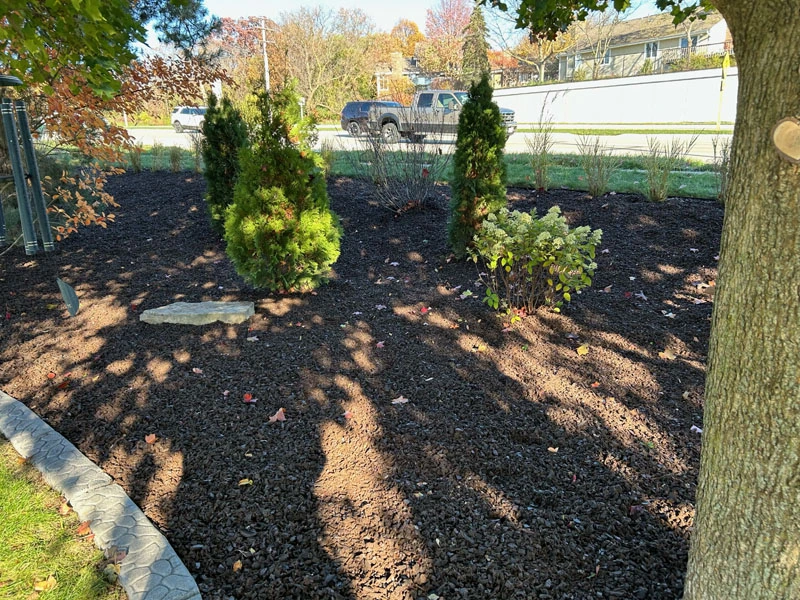
Problem: Landscaping in Chicago Isn’t for the Faint of Heart
Suppose you’re a homeowner, landscaper, or property manager in Chicagoland. In that case, you’ve likely faced the same battle every spring: weeds taking over, pests digging in, mulch washing away in the rain, and yet another weekend lost to yard maintenance.
Chicago’s climate doesn’t make it easy. One week it’s raining sideways, the next we’re in a heatwave. Snowmelt saturates the soil, and the clay-heavy ground makes drainage particularly challenging. Traditional landscaping materials, such as wood mulch, may look appealing at first, but they break down quickly, attract pests, and require replacement far too often.
For many, it’s a never-ending cycle of effort, expense, and frustration.
The Local Challenge: More Than Just Aesthetic Annoyance
Weeds and pests aren’t just unpleasant—they’re costly. Weeds compete with your plants for water and nutrients, while pests like ants, termites, and rodents find food and shelter in organic mulch. In neighborhoods across Chicagoland—from Oak Park to Naperville to Hyde Park—residents are struggling to keep their yards clean, safe, and healthy without resorting to harsh chemicals.
And here’s the kicker: organic mulch, while natural, can make the problem worse by breaking down and feeding the very pests you’re trying to get rid of.
Enter the Solution: Rubber Mulch Built for Chicago Weather
Rubber mulch is not your average ground cover. Made from recycled tires, it’s designed to withstand exactly the kind of punishing conditions Chicago is known for.
But it’s more than just tough—it’s smart. Rubber mulch:
- Doesn’t decompose, so it lasts for years
- It is non-porous, preventing weed growth by blocking air and sunlight
- Doesn’t absorb water, helping prevent mold and mildew
- It is unappealing to pests, which means fewer bugs and no need for pesticides
- Comes in multiple colors to suit any style—from rustic redwood to modern black
Whether you’re refreshing a front yard bed in Evanston or overseeing a playground in Joliet, rubber mulch offers peace of mind—and fewer weekend chores.
How It Works: Stop Weeds Before They Start
Rubber mulch forms a dense layer that prevents weeds from establishing a foothold. Without sunlight and airflow, weed seeds can’t germinate.
Compare that with bark mulch, which breaks down into compost-like material—prime real estate for weed growth. Even if you’re using weed barrier fabric under organic mulch, that too gets compromised over time.
With rubber mulch, the barrier lasts. You’ll spend less time weeding and more time enjoying your yard.
Say Goodbye to Pests (and Chemicals)
Termites and ants love moist, decaying wood. Rubber? Not so much. It doesn’t offer food or nesting grounds, which means fewer infestations—and less need for chemical deterrents.
Rubber mulch also reduces the habitat for ticks and fleas, making it a safer environment for pets and children. No more worrying about what’s lurking under your mulch pile.
Built to Withstand Chicago’s Toughest Seasons
Chicagoland’s weather can be brutal. Freeze-thaw cycles, high winds, spring floods—you name it. Rubber mulch isn’t fazed:
- Stays put in storms
- Won’t rot or freeze
- Retains its vibrant color year-round
- Won’t compact or turn to mush
While organic mulch often blows away or floats off during storms, rubber mulch remains in place. It’s heavy enough to resist movement, yet permeable sufficient for water to drain through, avoiding standing water and root rot.
Added Bonus: Save Water, Support Soil Health
Rubber mulch helps your garden retain moisture where it matters—in the soil. It acts as a protective blanket, reducing evaporation and keeping roots cool in summer and insulated in winter.
That’s especially helpful in drought-prone areas or when watering restrictions are in effect. And since rubber mulch doesn’t absorb water itself, every drop goes to your plants, not the mulch.
A Smart Choice for Sustainability
More Chicagoland homeowners are asking: “How can I landscape responsibly?” Rubber mulch offers a meaningful answer.
Each installation helps divert tires from landfills, repurposing waste into a durable, eco-conscious product. It also reduces chemical runoff from fertilizers and pesticides by minimizing their use.
In a city committed to sustainability through community gardens, green infrastructure, and LEED-certified buildings, rubber mulch is a natural fit.
Built-In Style: More Than Just Functional
Rubber mulch isn’t just practical—it’s beautiful. Available in various colors and textures, it works with any landscaping vision:
- Use it to frame drought-tolerant plants in your South Loop rooftop garden
- Brighten up shaded corners in your Glenview backyard with vibrant red or brown hues
- Design pet-friendly, soft-surface play areas in your local community space
Modern landscaping in Chicago isn’t just about curb appeal—it’s about longevity, safety, and innovative design. Rubber mulch delivers on all fronts.
NEW: Rubber Mulch for Multi-Use Spaces
As a growing trend, many property owners are blending functionality and design by using rubber mulch in non-traditional spaces:
- Around fire pits for a safer, fire-resistant ground cover
- In dog runs and pet zones, to keep paws clean and reduce odor
- Beneath swings, jungle gyms, and splash pads for added safety
Its versatility makes it an excellent investment for both residential and commercial properties—from backyard retreats to schoolyards to office plazas.
Locals Trust It—So Should You
Chicago homeowners and property managers are turning to rubber mulch not just because it looks good, but because it works.
It fights weeds, deters pests, handles the weather, and saves time. It’s one of the few landscaping choices that improve your yard’s health, appearance, and safety while reducing maintenance costs year after year.
Get Started with Recycled Rubber Mulch
Want fewer weeds, fewer bugs, and a better-looking yard that’s built to last?
Contact Recycled Rubber Mulch today for a free consultation and discover how we help Chicagoland homeowners create clean, sustainable, low-maintenance landscapes—without the stress.

